How Odyssey is Science and Evidence-Based
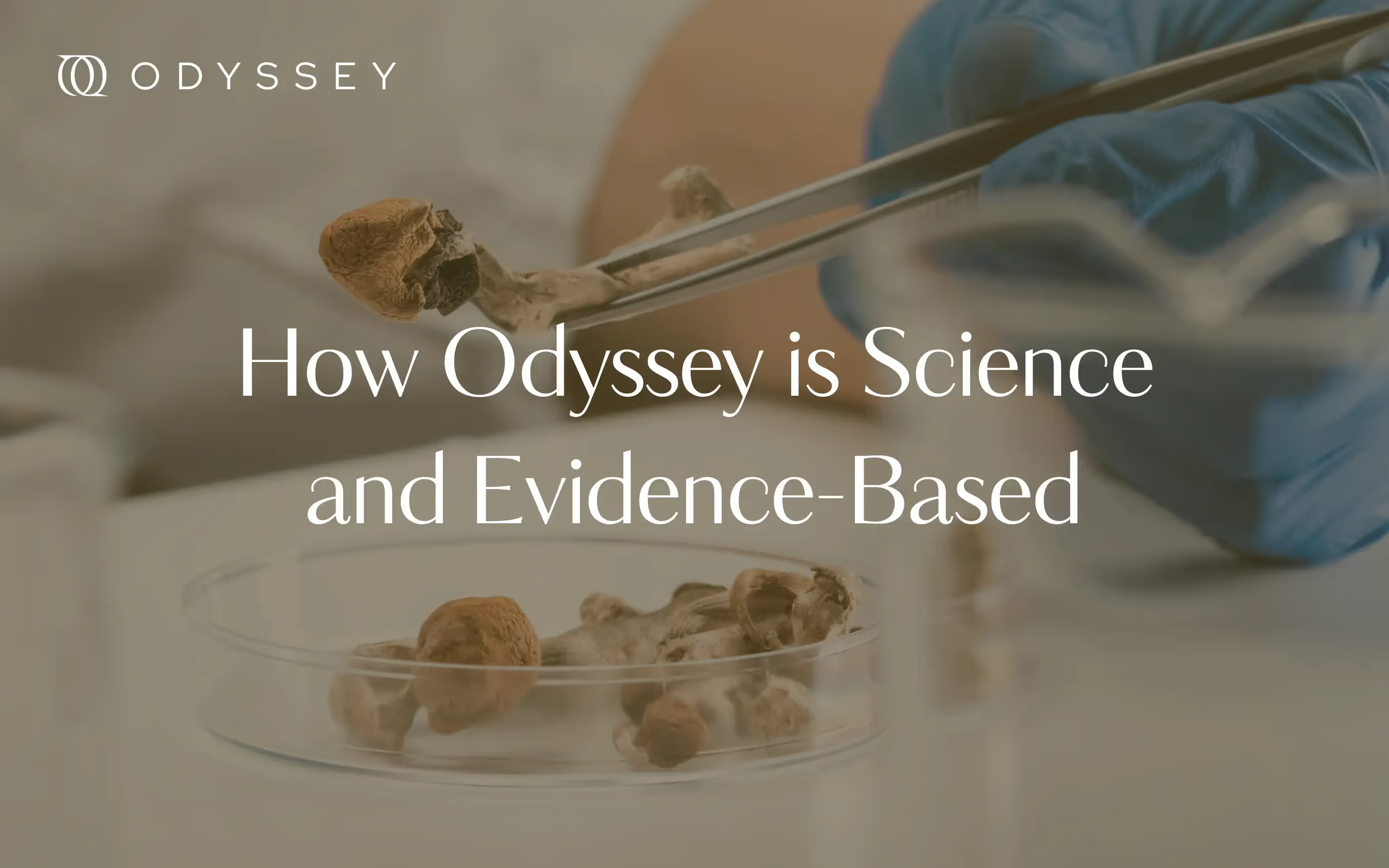
Beginning in the mid-2000s, a new wave of psychedelic research ushered in what is now known as the “psychedelic renaissance”. Initial studies led to an explosion of further research, policy change, extensive media coverage, and widespread public interest in psychedelics.
Core to our mission at Odyssey is making these experiences approachable to the millions of Americans who could benefit from safe, guided psilocybin sessions. We know that many of these people, ourselves included, are strongly influenced by science, and may be wary of modalities considered alternative or unconventional. Odyssey was born with a firm grounding in science, and an objective approach that is careful not to explicitly or implicitly push religious or spiritual views on our guests.
The end-to-end Odyssey experience is modeled after best practices used in modern clinical trials and psychedelic research studies. This article describes the many ways in which our evidence-based approach is built on a foundation of science, from the ground up.
Screening and Intake
The Odyssey screening and intake process is designed to ensure any individual is an excellent candidate for a psilocybin experience. Our team follows the latest developments in psychedelic science, and updates this process based on the published literature. We take into account an individual’s background, intentions, preferences for a psilocybin experience, and more. As in contemporary clinical trials and research studies, there’s a strong emphasis on safety. Our safety considerations include prescription medications and supplements that may interact with psilocybin, the physiological safety of psilocybin, and the psychological safety of psilocybin.
Explore our comprehensive safety measures for psilocybin experiences.
Preparation, Psilocybin Session, Integration
The end-to-end Odyssey experience consists of three primary components: preparation, psilocybin session, and integration. This is the standard psychedelic therapy format used in contemporary clinical trials and research studies.1 Depending on the specifics of a study, the number of preparation, administration, and integration sessions may vary, but the basic structure is always the same.
Preparation
Intentional preparation is essential to maximizing the benefits of a psychedelic experience. The general purpose of preparation is to set intentions for the experience, build connection and trust with the session facilitator(s), and to learn about what to expect from the session format and from psilocybin itself.1
As part of preparation, we recommend taking time and space to deeply reflect on your intentions and core reasons for entering into a psilocybin journey. When you book a group retreat or private session with Odyssey, we’ll provide a package of resources to support you in this process. Group retreats include novel activities to help prepare for the experience. Private sessions include two hour-long, one-on-one preparation calls with your facilitator in the weeks preceding the session.
Administration Session following SaS (Set and Setting) Protocol
Research has demonstrated the importance of “set” (and individual’s mindset) and “setting” (the physical setting within which the experience takes place) when undergoing a psychedelic journey.2 In modern clinical trials and psychedelic research studies, great efforts are made to intentionally prepare the set and setting to ensure the safest, most beneficial journey possible.1
At Odyssey, we follow a Set and Setting (SaS) Protocol modeled after the gold standard used in clinical trials and research studies. The core elements of the SaS protocol are described in detail below.
Set (Psychological Orientation) for Psilocybin Sessions
“Set” refers to an individual’s mindset, or psychological orientation, leading up to and throughout a psychedelic experience. During a psilocybin session, participants in clinical trials and research studies are encouraged to focus on their inner experience with an attitude of openness and acceptance. A common adage is “trust, let go, be open” (TLO).3
Our approach at Odyssey is the same. We encourage individuals to trust their process, let go into the experience, and be open to whatever may arise during a session. While setting intentions is helpful and highly encouraged, we recommend letting go of any expectations for a particular experience or outcome.
Other instructions provided to study participants often include suggestions such as:
“If you see a door, walk through it.”
“If you see a window, look through it.”
“Trust the trajectory, follow your path.”
"If you feel like you’re dying, melting, dissolving, exploding, going crazy etc.—go ahead, embrace it."
"Climb staircases, open doors, explore paths, fly over landscapes."
Another helpful suggestion can be to “float downstream”. Instead of clinging to the metaphorical banks of the river, allow the current to take you wherever it’s headed. Common themes throughout include an emphasis on allowing the experience to unfold naturally, with an orientation of curiosity, openness, and acceptance.
Setting for Psilocybin Sessions
Psychedelic research studies at Johns Hopkins, NYU, and other institutions use a comfortable, aesthetically-pleasing physical setting for their psilocybin sessions.
Essential elements of a physical setting include that it be:
- Safe
- Physically comfortable, with space to lay down and convenient bathroom access
- Aesthetically pleasing
- Quiet
- Free of potential distractions or interruptions
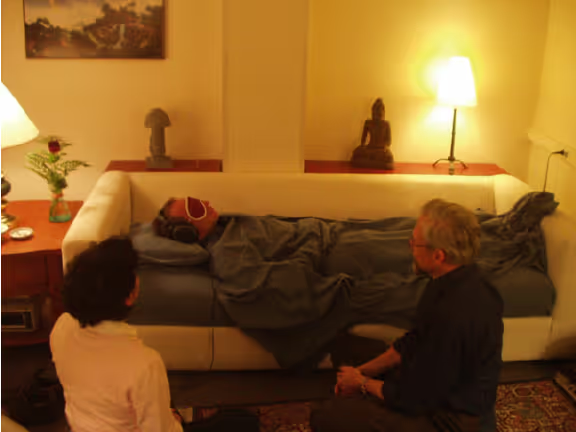
Psychedelic scientists are often constrained by the requirements of research, and have historically had to convert settings that are not ideal (e.g. medical or research laboratories) into comfortable, pleasant psychedelic session rooms.4
At Odyssey, we work with licensed service centers that have been designed specifically for psilocybin journeys. These centers incorporate all of the above elements and more, creating an ideal setting for deep, healing, transformative experiences.
Eye Shades and Music
Another essential element of physical setting, in both psychedelic research and Odyssey’s protocol, is the use of eyeshades and music. The intention behind the use of eyeshades and music is to help facilitate an inner journey; supporting an individual in going deeper into their psychology, emotions, sensations, sense of self, and beyond.
Music playlists are curated to match the arc of the psychedelic experience. This generally involves a soft opening, an escalation, a peak, and then a de-escalation and resettling. Mostly instrumental music is used, with few or no English vocals. In an Odyssey private session, your facilitator can work with you to personalize the session playlist.
Psilocybin Dosing
Modern clinical trials and research studies use a dose range of approximately 25-40mg of psilocybin (equivalent to approximately 4-6g of dried mushrooms).5 At Odyssey, we use doses within the same range, while also taking into account an individual’s intentions, preferences, and past experience (or lack thereof) when determining dose.
Psilocybin itself is subject to strict controls when used in research settings. Similarly, Odyssey’s psilocybin is stored in a secure, environmentally controlled and monitored area. Our psilocybin is sourced locally from licensed manufacturers and lab-tested to ensure its quality, potency, and allow for precise dosing.
Supportive, Non-directive Facilitation
Trained, qualified facilitators are present for the entire duration of psilocybin sessions, in both research studies and the Odyssey experience.
Studies at Johns Hopkins, NYU, and other institutions employ a non-directive style of support during administration sessions.6,3 A non-directive style means that facilitators provide warm, compassionate support and empathetic presence, without attempting to direct an individual’s experience. Modern psychedelic practitioner training programs such as MAPS, Fluence, and others also teach this approach.
Odyssey’s facilitators follow a non-directive approach. This means that as a default, facilitators will ensure a client’s safety and comfort, allowing the client’s process to unfold naturally while remaining responsive to their needs. The theoretical grounding of this approach lies in the belief that the source of the healing and transformation each person most needs lies within themselves, and that this process is best served by providing unconditional, compassionate, non-directive support.
Odyssey facilitators will:
- Allow your psilocybin experience to unfold naturally
- Provide warm, compassionate, attentive, unconditional support
- Ensure your physical safety and comfort
- Discuss consent around the use of touch before each psilocybin session, and request permission to use touch if consent has been provided
Odyssey facilitators will not:
- Attempt to direct your psilocybin experience
- Intervene in or interrupt your psychological and emotional process
- Use touch without first obtaining your consent
- Attempt to implicitly or explicitly persuade you of any spiritual or religious views or belief systems
Meet our dedicated and trained psilocybin facilitators.
Integration
An intentional integration process is as important, if not more important than the psychedelic experience itself. The general purpose of integration is to begin to make meaning of a psychedelic experience, and to incorporate insights gained from the experience into daily life.1 An integration process is core to all modern psychedelic clinical trials and research studies.
After a group retreat or private session with Odyssey, you’ll receive a comprehensive package of resources to support you with your integration process. Group retreats include a full day for integration, with activities designed to harness the post-journey neural plasticity and maximize the benefits of the experience. Private sessions include two hour-long, one-on-one integration calls with your facilitator in the weeks following the session.
Integration is essential to transforming the insights and understandings from your journey into lasting, sustainable positive change in your life, and the Odyssey process is designed to ensure you’re supported throughout.
The Odyssey Team
Founded by a Stanford-trained aerospace engineer and advised by Stanford and Harvard-trained psychiatrists, the Odyssey team has an exceptionally strong grounding in science. Our management team’s experience also includes working with MAPS, chemical engineering, and serving on the board of a popular psychedelic science conference. Our advisors include experts from UCSF and MAPS clinical trials. Our team follows the latest developments in psychedelic science and related fields, and updates our processes based on the published literature.
Odyssey’s facilitation team is carefully selected according to a range of criteria that includes background, experience, training, and approach. We look first and foremost for facilitators with a strong, warm, compassionate, and wise presence. With their non-directive approach, Odyssey facilitators don’t attempt to persuade clients of any particular view or agenda, spiritual or otherwise. Another essential criterion for facilitator selection is to ask ourselves, “Would I send a close family member to work with this person?” The answer for every facilitator at Odyssey is a resounding “Yes!”
Explore the expertise behind Odyssey’s facilitation team
Odyssey Clientele
Psychedelic research studies employ strict inclusion and exclusion criteria when selecting individuals for participation. At Odyssey, we are focused on serving those who we believe will benefit most from our services. This means assessing individuals holistically, on a case-by-case basis. We consider background, intentions, preferences, the safety dimensions outlined above, and more.
We believe individuals should be fully informed about the potential risks and benefits of psilocybin, before committing to an experience. Our extensive FAQ and article Psilocybin Services: Taking Safety Seriously are great places to start. Further information will be provided at the beginning of, and throughout, an Odyssey experience.
Outcome Measures
Psychedelic research studies use a variety of measures to assess outcomes, depending on the goals of a study. Outside of a research setting, these measures can be helpful for individuals and/or facilitators to track the impact of a psilocybin experience over time. Measures that increase visibility and understanding into our own subjective states can also support the ongoing integration process. At Odyssey, these measures are never mandatory; we see them as helpful tools and employ them on a case-by-case basis depending on an individual’s interest.
Certain instruments are designed to measure the severity of specific conditions. Measures of this type we may use include:
- Patient Health Questionnaire-9 (PHQ-9): A scale for assessing depression, consisting of 9 items that align with the criteria for major depressive disorder in the DSM-IV.
- Generalized Anxiety Disorder 7-item (GAD-7): A brief measure used to assess generalized anxiety disorder. It evaluates the severity of anxiety symptoms over the preceding two weeks.
- Beck Depression Inventory (BDI): A widely used, self-report inventory for measuring the severity of depression. It contains 21 items, each addressing a specific symptom or attitude related to depression.
- State-Trait Anxiety Inventory (STAI): Helps in evaluating both current levels of anxiety (state) and more general anxiety tendencies (trait) in individuals.
- Yale-Brown Obsessive-Compulsive Scale (Y-BOCS): Specifically designed to measure the severity and type of symptoms in individuals with obsessive-compulsive disorder (OCD).
- Hospital Anxiety and Depression Scale (HADS): Used to assess anxiety and depression symptoms in hospital settings, including among patients with terminal illnesses.
Other instruments are used to measure general quality of life and subjective wellbeing. These include:
- Short Form Health Survey (SF-36 or SF-12): A generic quality of life assessment tool that measures physical and mental health, and can be useful for evaluating general improvements in wellbeing.
- Life Satisfaction Scale: Assesses overall life satisfaction, providing a direct measure of wellbeing that can complement other, more specific measures.
Certain instruments also measure the qualities of the psychedelic experience itself, including:
- Mystical Experience Questionnaire (MEQ30): Used to quantify aspects of psychedelic experiences that are similar to naturally occurring mystical experiences, including a sense of unity, sacredness, ineffability, peace, and joy.
- Altered States of Consciousness questionnaire (ASC): Measures changes in consciousness induced by psychedelic substances, covering aspects like visual alterations, auditory changes, and alterations in the sense of time and space.
The Odyssey Experience: Expanding on a Scientific Base
While the end-to-end Odyssey experience is heavily grounded in science, the nature of research poses certain limitations that are not present when providing psilocybin sessions to the wider world. We’re fortunate to be able to use protocols based in science, while expanding on them when it seems most helpful.
Research Studies Have Domain-Specific Constraints
The primary purpose of a scientific study is to evaluate a hypothesis and measure effects, with the intention of establishing causality between variables. In research with humans, this often means standardizing procedures across all participants, regardless of individual difference. In this sense, research optimizes for the testing and measurement of outcomes, and not the outcomes themselves.
Research can also pose high demands on participants. This may include an extensive number of self-report measures (e.g. completing up to 20 separate questionnaires), or participating in a placebo control group where another substance (e.g. niacin or methylphenidate) is administered instead of psilocybin.
Many studies also employ strict exclusion criteria that, while important for testing certain hypotheses, aren’t relevant outside of a research context (e.g. having used a psychedelic substance within the past five years). As mentioned above, most research environments also don’t provide the ideal physical setting for a psychedelic session.4
More Flexible, Personalized Support
Psilocybin services allow us to provide more personalized, flexible support through preparation, psilocybin session, and integration.
During preparation, a facilitator may suggest specific practices or resources, depending on an individual’s unique characteristics. Group retreats allow for group preparation activities that are not possible in individual psychedelic therapy. Private sessions can include multiple preparation sessions - as many as needed - until an individual feels fully ready for the psilocybin session.
Psilocybin dosing is also more flexible. While our standard dosing is always in the same range as that used in studies, this can be adapted based on need. If, for example, it’s someone’s first psychedelic experience, they’re very nervous, and they have a strong preference for starting with a lower dose.
Most research to date has used a single dose of psilocybin in each administration session. The added flexibility of psilocybin services allows us to offer an optional booster dose, in addition to the initial dose. Clients first take an initial dose, and after approximately 90 minutes, a facilitator offers an optional booster dose (approximately one-half of the initial dose). The optional booster dose allows for the potential deepening of the psilocybin experience within a single session. In our experience, this greatly contributes towards maximizing the benefits of a session.
As with preparation, we can also provide more personalized integration support. A facilitator may use a particular therapeutic modality, or suggest specific practices or resources for integration, depending on the individual. The number of integration sessions can also vary.
Group Psilocybin Retreats
In most research settings, individuals are administered psilocybin in the presence of only the session monitors or facilitators. At Odyssey, we can offer group retreats, which provide a number of benefits.
A retreat format can greatly enhance “set and setting”, and help create a stronger psychological container around the psilocybin experience. It can be incredibly helpful to leave behind our regular routines, habits, and the ingrained patterns of daily life to travel to a fresh, new place. Engaging in a psilocybin journey in a new setting, with new people, can help us leave the experience with new thought patterns, beliefs, outlooks, and more. The break from the normalcy of the everyday can facilitate the “reset” we’re looking for.
The opportunity to connect with like-minded others is another benefit of a retreat setting. Many find it refreshing and energizing to simply be in the company of others in a similar mindset, before even ingesting psilocybin! Witnessing others in their process, and being witnessed in our own, in a compassionate, open, and non-judgemental atmosphere can also be powerful. There’s a normalizing effect when we see that others’ struggles are not so different from our own, and this can help us realize that we’re not so alone as it sometimes feels. While the psilocybin journeys on retreats are inwardly focused, sharing the broader experience with a group can be a unique opportunity to lean into the joyous and connective aspects of psilocybin. Commonly, retreat participants enjoy staying in touch following the experience.
Retreats also include the practical and psychological benefits of full, abundant hospitality. Enjoy comfortable, spacious accommodations, delicious meals, and stunning scenery at our one-of-a-kind retreat center in Bend, Oregon. Retreat hospitality takes the mental load off, so you’re free to fully focus on your own process. Once the retreat and travel are booked, you can “set it and forget it” - leave the rest to us.
Discover what to expect from Odyssey’s group psilocybin experiences.
Conclusion
The end-to-end Odyssey experience is built on a foundation of science and evidence, from the ground up. Our team stays current with developments in relevant fields, and updates our processes based on the published literature.
Our screening and intake process ensures clients are a great fit for a psilocybin experience, with a particular emphasis on safety. The Odyssey experience includes three primary components: preparation, psilocybin session, and integration, which is in line with the structure of psychedelic therapy provided in modern clinical trials and research studies.
Psilocybin sessions follow a Set and Setting (SaS) Protocol modeled after those used in research. Clients are encouraged to focus on their inner experience with an orientation of curiosity, openness, and acceptance. Sessions are held in a comfortable, aesthetically-pleasing space where clients lay down, wear eyeshades, and listen to curated music. Licensed facilitators provide compassionate, non-directive support and are present throughout the entire experience. Our psilocybin dosing ranges from approximately 25-40mg, which is based on that used in research.
The Odyssey team is firmly grounded in science, with backgrounds in aerospace engineering, clinical psychology, psychiatry, and clinical trial work with UCSF and MAPS.
We are committed to serving the clients we believe our services will benefit most. This means assessing individuals holistically and on a case-by-case basis, while providing information to educate and inform about the potential risks and benefits of psilocybin. We may use a variety of standardized measures to track outcomes, depending on client interest.
Research studies have domain-specific constraints, and psilocybin services allow us to expand on a scientific base to provide more personalized, flexible support. This can include individualized preparation, integration, and variable dosing with an optional booster dose.
We’re also able to offer psilocybin experiences in a group retreat setting. Group retreats offer a number of benefits including enhanced “set and setting”, connection with like-minded others, and the enjoyment and convenience of full hospitality.
References
1. Aday, J. S., Heifets, B. D., Pratscher, S. D., Bradley, E., Rosen, R., & Woolley, J. D. (2022). Great Expectations: recommendations for improving the methodological rigor of psychedelic clinical trials. Psychopharmacology, 239(6), 1989–2010. https://doi.org/10.1007/s00213-022-06123-7
2. Nichols D. E. (2016). Psychedelics. Pharmacological reviews, 68(2), 264–355. https://doi.org/10.1124/pr.115.011478
3. Griffiths, R. R., Johnson, M. W., Carducci, M. A., Umbricht, A., Richards, W. A., Richards, B. D., Cosimano, M. P., & Klinedinst, M. A. (2016). Psilocybin produces substantial and sustained decreases in depression and anxiety in patients with life-threatening cancer: A randomized double-blind trial. Journal of psychopharmacology (Oxford, England), 30(12), 1181–1197. https://doi.org/10.1177/0269881116675513
4. Johnson, M., Richards, W., & Griffiths, R. (2008). Human hallucinogen research: guidelines for safety. Journal of psychopharmacology (Oxford, England), 22(6), 603–620. https://doi.org/10.1177/0269881108093587
5. Garcia-Romeu, A., Barrett, F. S., Carbonaro, T. M., Johnson, M. W., & Griffiths, R. R. (2021). Optimal dosing for psilocybin pharmacotherapy: Considering weight-adjusted and fixed dosing approaches. Journal of psychopharmacology (Oxford, England), 35(4), 353–361. https://doi.org/10.1177/0269881121991822
6. Bogenschutz, M. P., & Forcehimes, A. A. (2016). Development of a Psychotherapeutic Model for Psilocybin-Assisted Treatment of Alcoholism. Journal of Humanistic Psychology, 57(4), 389–414. doi:10.1177/0022167816673493

.svg)
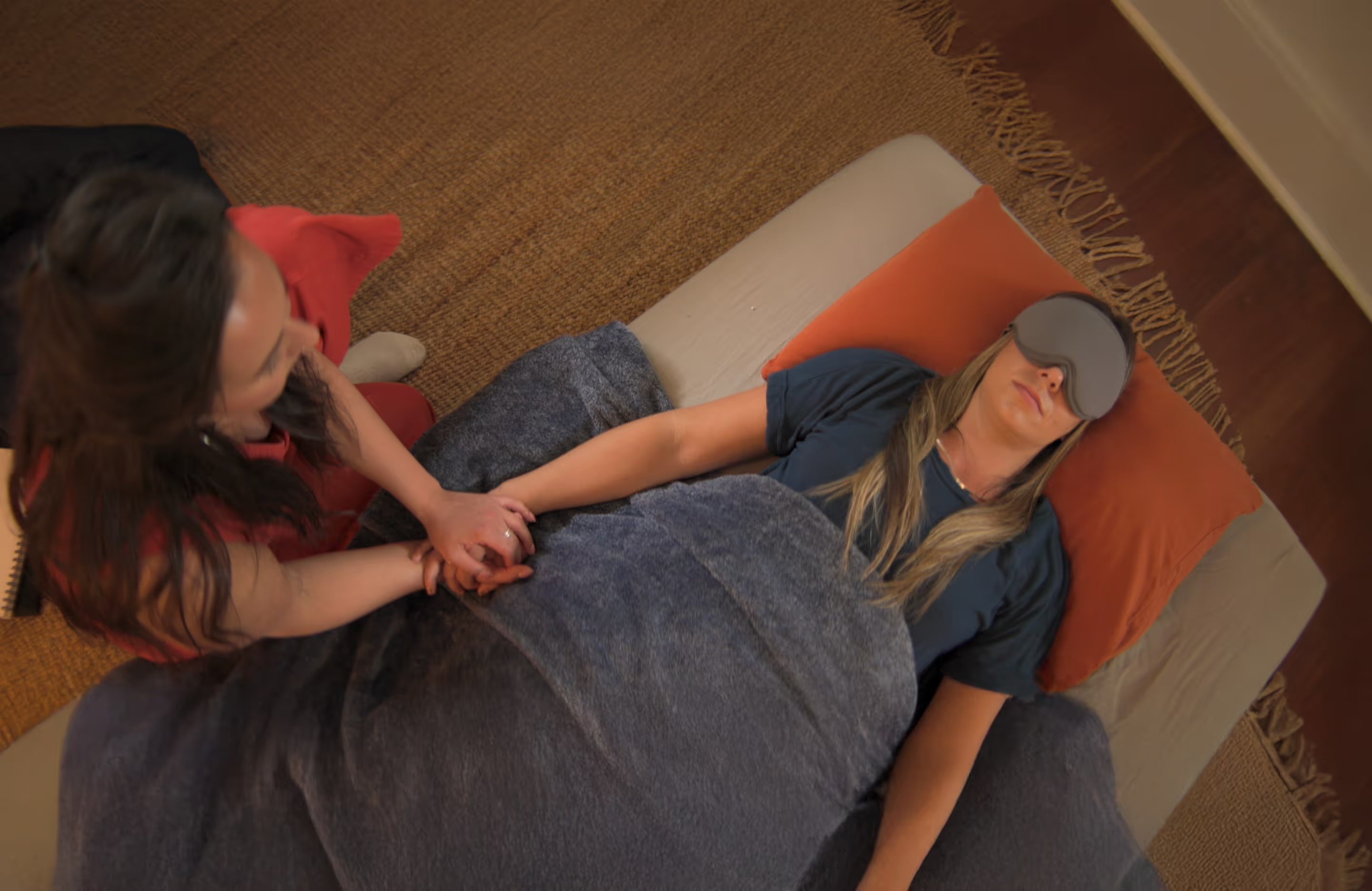
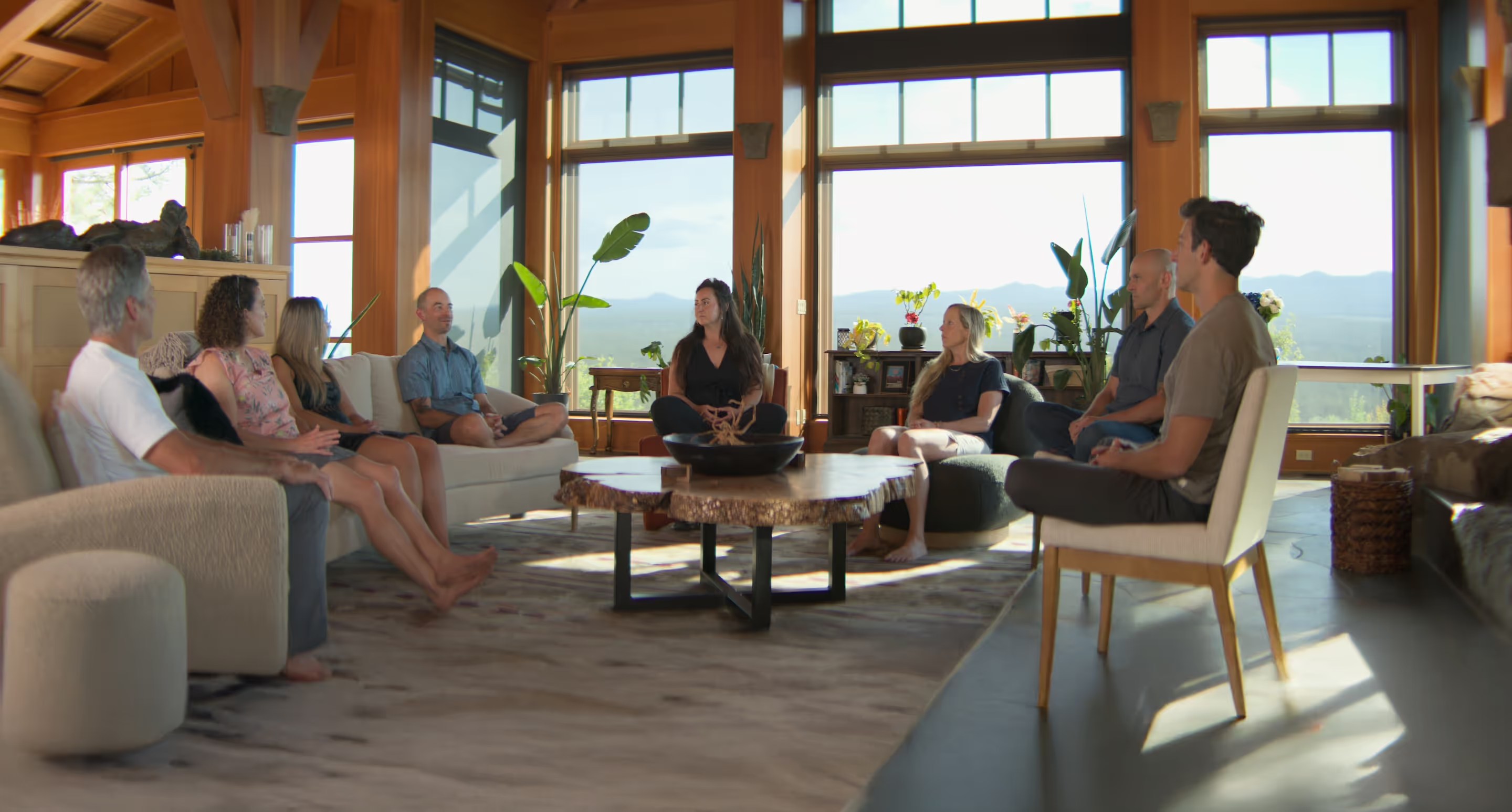


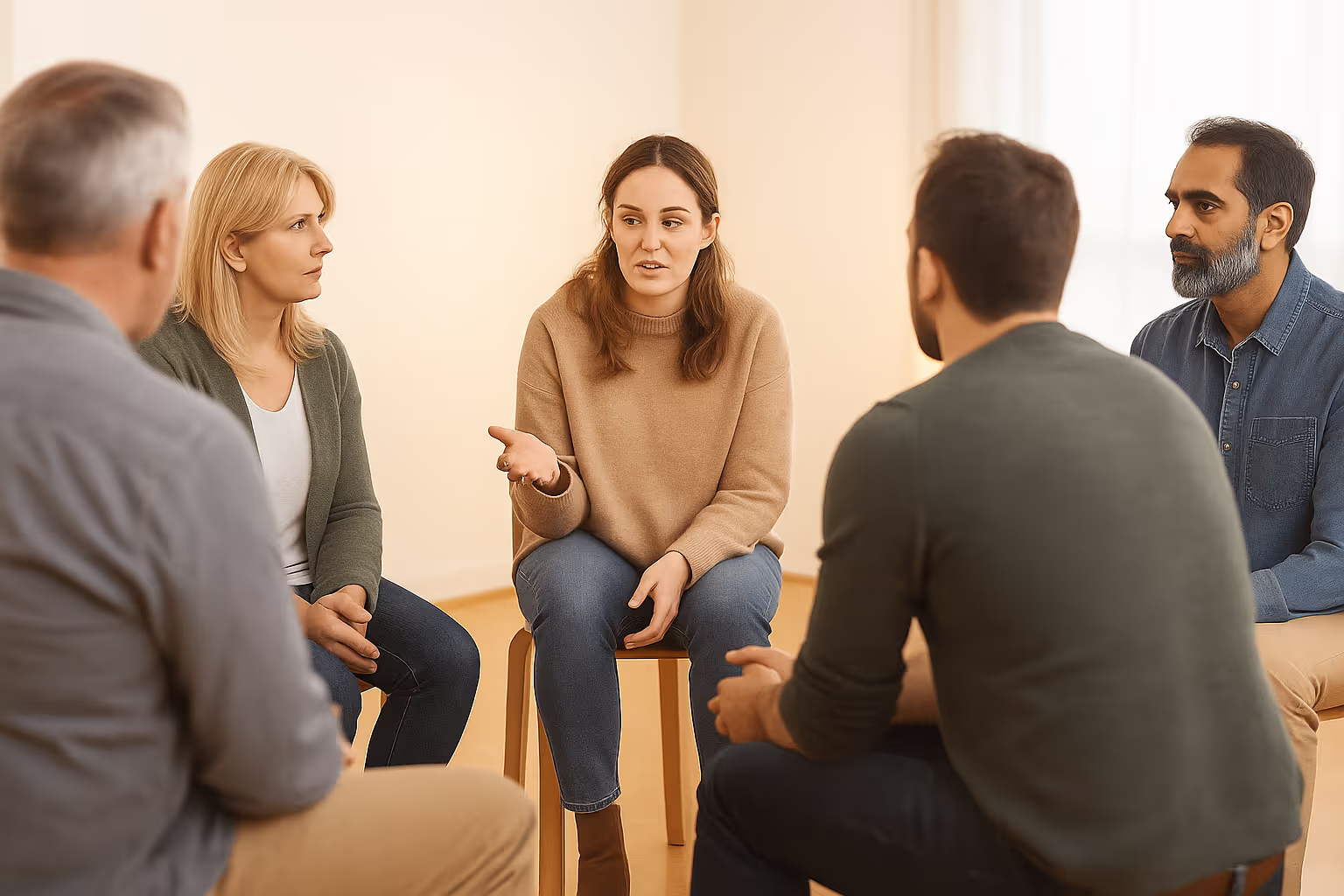




.svg)